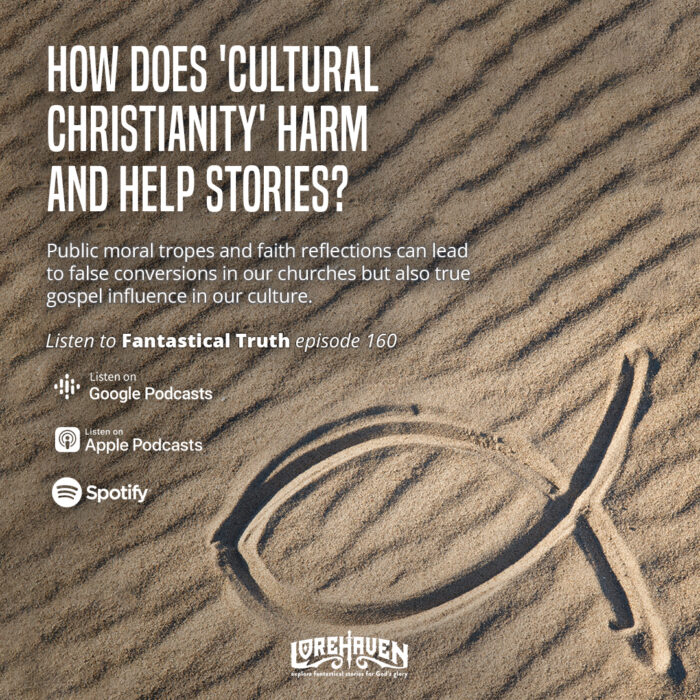160. How Does ‘Cultural Christianity’ Harm and Help Stories?
Podcast: Play in new window | Download (Duration: 1:15:35 — 70.5MB) | Embed
Did you grow up in “cultural Christianity”? Do you think this background helped you love Jesus more, or drove you away from him? What would your neighbors think? As people debate whether we even live in a Christian culture, how do these public moral tropes and gospel reflections influence our stories, Christian-made or otherwise?
Subscribe to Lorehaven
articles • news • library • reviews • podcast • gifts • guild
Episode sponsors
- Enclave Publishing: Radiant by Ashley Bustamante
- The Wizard’s Stone by Herman P. Hunter
- The Pop Culture Parent
1. What do we mean by ‘cultural Christianity’?
2. How does cultural Christianity hurt our stories?
3. How can cultural Christianity help our stories?
Quotes and notes
- What is Cultural Christianity?, GotQuestions.org
- In Praise of Cultural Christianity, Mere Orthodoxy
- Pop Culture Gets Religion, Christianity Today
- Positive, Negative, and Neutral World, First Things
Com station
Jo Ann Dagis Samide enjoys “dangerous books” in right ways:
Reading this thread made me feel so nostalgic. I loved reading to and with my five kids when we homeschooled. We used sonlight curriculum which had a great deal of fabulous reading choices. My youngest is 20 and my oldest is 35, and they all talk about the days of reading aloud and what we learned….
Keep it up, folks, you are truly doing the Lord’s work!
R. M. Archer commented on Twitter about A. D. Sheehan’s article:
Though this topic is nothing new to me, I personally found this @Lorehaven article timely to share given my very recent disappointment with the Dungeons & Dragons movie and with the season 2 finale of The Mandalorian.
Andreas commented on the article itself:
Good article. I feel the same way. In recent years, I’ve been going back to the classics more and more. Jane Austen and Jules Verne in particular are just fun to read. I personally found your first point particularly challenging. When I read “The Inklings” by Humphrey Carpenter a while back, all I could think to myself was, “I could never be friends with Charles Williams!” But you’re right. In such cases, it can be helpful to put aside one’s theological beliefs to discover literary treasures.
Next on Fantastical Truth
We’ve explored how big franchises keep failing their fans. More recently we delved into how some fiction can’t stop deconstructing its own heroes and lore. That’s frankly discouraging. Still, we’re not without hope, because we know some destroyed worlds can be restored! If we’ve already felt grief over a story’s death, how can we best celebrate a story that comes back to life?


































When it comes to opening the door for people, I see it as a positive thing, but I don’t think that it has to be solely done by men for women. If I am walking through a doorway, and someone is not too far behind me, I will often open the door for the person regardless of gender, because that’s a lot better than letting the door slam in someone’s face. Nearly everyone says thank you and I’ve never had anyone complain about a woman opening the door for them.
In fact, not long ago, there was a man carrying a couple of boxes with a pair of soft drinks on top. I was a couple yards behind him, but since I could see that his hands were full I sped up and told him I would get the door. He told me something like ‘Thank you. I didn’t know how I was going to get this through the door.’ Taking a couple extra moments to make someone’s day easier is a good thing overall. Not because of chivalric rules, and not because society expects us to be ‘socially responsible’, but because every person carries the intrinsic value and worth that comes with being one of God’s creations. That should be such a normal part of our mindset that we are naturally friendly and adopt helpful behaviors toward others. Obviously we have to have good boundaries, and we don’t have to adopt whatever ‘helpful’ gestures and beliefs society tries to force on us. But opening the door is a pretty good one, especially because it IS something we would be doing of our own free choice, instead of it being a norm that society forces on us.
As far as cultural Christianity goes, I did have a lot of that growing up and for the most part it was beneficial. Christianity was explained pretty well for me at a young age, and it resonated with me when it came to ideas like the deep imperfection of humanity, the problems with vengeance, the need for forgiveness and mercy, etc. There were some downsides as well, though, such as the fact that even though the Bible was interesting to me, growing up with it made regular Bible reading feel like a chore that I had a hard time doing even though I knew it was important, good and meaningful. Still, the positives outweighed the negatives.
But one of the reasons growing up with cultural Christianity worked in my case was because Christianity DID mean a lot to me. I was always analyzing everything I heard, so instead of just taking the cliches at a surface level, I would try to figure out why certain aspects of Christianity existed. There were times I struggled with going through the motions, but I’m at least aware of that, and it’s something I’ve been working on over the years.
Also, I will note that when it came to the Christians I was around day to day, there was a lot of talk about ACTUALLY being saved and having a relationship with God, rather than simply knowing about him or doing good works. That was one reason why I had doubts about my salvation growing up, which was stressful, and there’s still some things I’m questioning. But I don’t regret that at all, because it will help me make sure that I am right with God. Also, it caused me to really search my mind and heart. Consequently, I learned more about myself than I would have otherwise, so it led to a lot of personal growth that I wouldn’t trade for the world.
Interestingly enough, this idea of making sure one has a real relationship with God rather than going through the motions somewhat feels like cultural Christianity to me, because it was the Christian culture I grew up with. But I know that other people wouldn’t see that as cultural Christianity because they grew up in a culture that taught different things, like the notion that good works alone will get someone into Heaven.
One important thing to note is that going through the motions and other such problems is not necessarily just a matter of cultural Christianity. These are things that nearly any Christian could fall into. So maybe, in a lot of cases, cultural Christianity can be more of a symptom or natural result instead of the problem.
I identified with Zackary’s story. I grew up and still live in a part of the country affectionately known as “the Bible Belt.”
Raised in a traditional denomination, we were in church every time the doors opened. Grandpa was a deacon, and Grandma sang in the choir. It was little surprise that I was baptized before my 8th birthday. But I had dedicated myself to church, and not to Christ. I knew about Jesus, but I didn’t know Jesus. I was all about following the rules, but lacked the relationship.
Like many, I experienced a season of wandering in my early 20s. I claimed Deism, then Agnosticism, and then full on Atheism. But what I truly lived out was epicureanism and hedonism.
But that “cultural Christianity” had provided me with a foundation. I ultimately found a life of living only for my own pleasure to be empty. The people I liked and respected the most in my life were all active Christians and I decided to return to that foundation. Today, I claim to be a follower of Christ, and I pray that my life, both online and offline, reflects that.